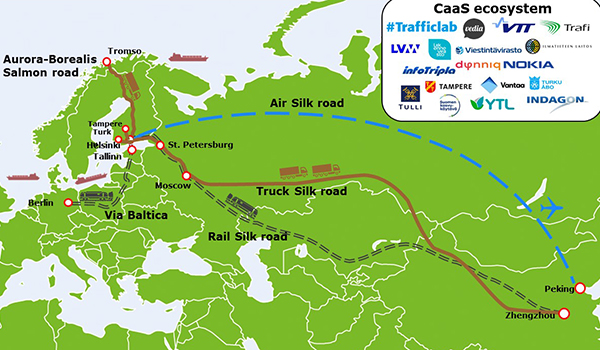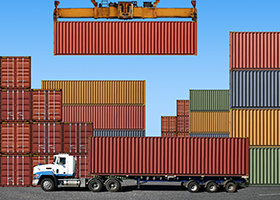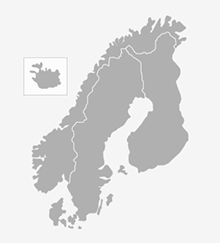Corridor as a Service (CaaS) is a new concept for smart logistics. The goal of the new operating model is to improve goods logistics in a business led manner in order to facilitate international commerce and to enable new value adding services for companies which are buying logistics and also for logistic service providers.
The CaaS concept derived from the Scanway IIb project, which is coordinated by the Finnish Transport Safety Agency Trafi’s Traffic Lab. During Scanway IIb feasibility study the CaaS concept and ecosystem is being developed together with the Technical Research Centre of Finland (VTT), Vediafi and other collaboration organisations.
What is Corridor as a Service?
Corridor as a service is developed in Finland under PPP collaboration (public-private-partnership) in the Scanway IIb feasibility study. Scanway projects have focused on international collaboration between Finland and Russia and the main focus areas have been emergency systems, ITS activities and interoperability. During 2017, the Scanway II project focused on those same topics, but research approach highlighted the importance of intelligent infrastructure and how this could be used to serve international logistics more effectively. During the Scanway II project, ideas about intelligent C-ITS road network was created and now the main purpose of ongoing feasibility study is to study the potential and attractiveness of CaaS and find the first real business cases for it.

CaaS corridor network and ecosystem. Illustration by Traffic Lab.
The goal of CaaS is to improve goods logistics through digital services in order that new value adding services can improve and expand international commerce. The feasibility study seeks to map out the operators and functionalities, which have the potential for developing the reliability, speed, transparency, quality, cost and resource efficiency of logistics. Based on this preliminary assessment, a new operating model will be developed, which is able to significantly improve the accessibility and attractiveness of logistic especially from a Scandinavian point of view.
For businesses, CaaS offers opportunities for developing both existing and new forms of business activities, for improving transport operations and for networking. In addition, CaaS is seen to enable transition from infrastructure based traffic management to intelligent IoT based communication asset management, where infrastructure, systems and vehicles communicates together.
While CaaS development is driven by companies, it has also strong and important public support from the Finnish ministry of transport and communications, the Finnish Transport Safety Agency Trafi, the Finnish Transport Agency, the Finnish custom, the Finnish Communications Regulatory Authority, the Finnish Meteorological Institute, the Growth Corridor Finland, the Regional Council of South Karelia and three cities: Turku, Vantaa and Tampere. These public authorities are very important for CaaS development, since in many cases they own the infrastructure and the traffic data, which is currently quite often provided as an open data.
What CaaS offers for companies and customers
For supplier companies, CaaS offers opportunities to develop and enhance current business with new business cases and collaboration initiatives. In March, the Finnish company Vediafi got national start-up funding and is now building their own service portfolio in collaboration with the feasibility study. Vediafi is now the first CaaS service provider and will start CaaS services from the beginning of 2019. Together with the feasibility study Vediafi is now looking for collaboration partners to join the CaaS-Net ecosystem and customer surveys are ongoing.
 For customers CaaS aims to provide new value adding logistics services, which will improve the efficiency and productivity of customers. In the first stage, these services focus on transparency and tracking of logistics chains, privilege driving for example in traffic lights and traffic control points and safety and security issues of logistic. In the future, CaaS services are planned so that automation and artificial intelligent can be adapted in the service portfolio. With these new services, the CaaS concept aims for at least 10 % productivity improvement, and via more efficient logistics and stable driving, for instance, to significant fuel savings.
For customers CaaS aims to provide new value adding logistics services, which will improve the efficiency and productivity of customers. In the first stage, these services focus on transparency and tracking of logistics chains, privilege driving for example in traffic lights and traffic control points and safety and security issues of logistic. In the future, CaaS services are planned so that automation and artificial intelligent can be adapted in the service portfolio. With these new services, the CaaS concept aims for at least 10 % productivity improvement, and via more efficient logistics and stable driving, for instance, to significant fuel savings.
What CaaS means for cities
Crucial aspect of CaaS development is PPP collaboration. While CaaS concept combines different cutting edge technologies, CaaS offers interesting development platform for cities, especially if private sector desires to invest on infrastructure as a return for new services. Of course, logistic accessibility and attractiveness via hubs and corridors interest cities, but also new wireless communication technologies (4/5G) are very hot topics, because these will be the basis of smart cities in the future. Although CaaS concept focuses now mainly on goods transport, it will also serve passenger transport in the future, since the same intelligent infrastructure will be used for both modes.
What CaaS offers for research
CaaS concept is combining recent technological solutions in exciting business environment and in CaaS vision automation, open ecosystems together with transparent and robust data sharing is playing a significant role. All these changes must be validated and the impacts analysed. Thus it is clear that there are many aspects where research institutes must contribute, although CaaS is now strongly driven by business sector. At first phase, CaaS business will be built upon current technologies, but the business sector needs collaboration with the research sector in resolving how to integrate next generation solutions to logistic operations and how to change current relatively closed business environment towards more open and transparent CaaS ecosystem approach.
Further information: https://www.trafficlab.fi/news/6059/corridor_as_a_service_streamlines_goods_logistics
https://www.trafficlab.fi/news/6020/finland_as_a_smart_logistics_global_hub
https://www.trafficlab.fi
 Contact:
Contact:
Lasse Nykänen
lasse.nykanen@vtt.fi
VTT, Finland
Contact:
Noora Lähde
noora.lahde@trafi.fi
Finnish Transport Safety Agency






Follow us: